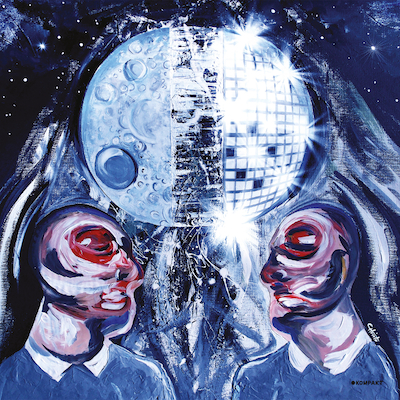This is not an album to simply commute to work to. This album demands to be experienced at full blast in a planetarium alongside a weeping Matthew McConaughey, the wonders of the cosmos filling your senses as Alex Paterson and Thomas Fehlman once again map out a sonic journey to the stars. It’s been a while since house music’s own Pink Floyd produced a record devoid of collaborators (their last pure release was 2009’s oddity Baghdad Batteries, before a spate of guest albums featuring Lee ‘Scratch’ Perry and, fittingly, David Gilmour), but Moonbuilding 2703 AD sees them retreating back into their own strange little ambient world. This, combined with the fact that Paterson’s ever rotating roster of sidemen has stabilised for longer than any other period in the group’s career, helps make this the most Orb-ish of The Orb’s albums since Orblivion.
The concept of the album, as far as the duo can stick to a concept, is mankind’s discovery of the origins of ancient civilisation on the moon. Or, as the ever lucid Alex Paterson puts it, "Moonbuilding 2703 BC is inspired by this place called earth and the idea that in the future mankind discovers its root element in the ancient rocks on solar moons, which are based on musical harmonies, that despite being imprinted a billion lights years ago, are set to the same tempo as the Orb". Peterson’s claims, while just about legible, fail to convey much about the content of the album. This four song, 50 minute space-time odyssey might be intended to soundtrack a latter-day Lindsey Graham’s voyage to the moon; but really it sounds more like the soundtrack to Mark "Bez" Berry trapped on the ISS, klaxons sounding and rotors whirring to a stop as he spills beer and Ready Brek all over the command console.
No matter how impressive The Orb’s ever-morphing soup of textures, samples and motifs becomes (and their ear for a subtle transition is impressive, especially on the luscious ‘Lunar Caves’) there is still something unescapably 90s trance about the whole affair. It’s hard to single-handedly pioneer an entire genre and not remain in some way bound to it, a fact that undermined much of The Orb’s post-millennial career. However, considering that the core theme of Moonbuilding 2703 AD is melding the technological possibilities of science fiction with the mysterious civilisations of the distant past, its retro-futuristic vibe feels entirely appropriate. There are moments in the title track and opener ‘God’s Mirrorball’ where the pair’s deft experiments with sampled sound evoke the ghost of the old Hitchhiker’s Guide To The Galaxy radio series and the early days of the BBC’s sound archive, when distant alien civilisations and the concept of the infinite void could be conveyed through a few five second soundbites rather than the vast CGI panning shots of Ridley Scott and J.J. Abrams.
At this point The Orb are unlikely to ever reinvent themselves. The natural ebbs and flows of the sonic monstrosities they call ‘songs’ sound like the automatic processes of two sleepless machines that have been programming beats and synthetic swells since the dawn of time and feel like they’ll keep on playing long after our sun burns itself out. Which is a good thing. Ultimately Moonbuilding 2703 AD is an immersive, imaginative journey into the unknown that, unfortunately, won’t end up being the space travel concept album of the year. Public Service Broadcasting have already locked that down. Top marks for effort though.
<div class="fb-comments" data-href="http://thequietus.com/articles/18164-the-orb-moonbuilding-2703-bc-review” data-width="550">


